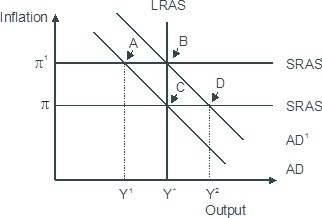Why do economists believe that it is socially optimal to have some amount of pollution?
What will be an ideal response?
Economists recognize the trade-off between producing a cleaner environment and producing other goods and services. Zero pollution could be achieved only if people give up resources for producing other goods and services. The optimal amount of pollution is therefore determined by equating the marginal cost and marginal benefit of reducing pollution at very high levels of pollution abatement, and the marginal cost for zero pollution is much higher than its marginal benefit.
You might also like to view...
Which of the following will cause an increase in output per effective worker?
A) an increase in population growth B) an increase in the rate of depreciation C) a reduction in the saving rate D) an increase in the rate of technological progress E) an increase in the saving rate
Based on the figure below. Starting from long-run equilibrium at point C, a tax cut that increases aggregate demand from AD to AD1 will lead to a short-run equilibrium at point ________ and eventually to a long-run equilibrium at point ________, if left to self-correcting tendencies. 
A. D; C B. B; C C. B; A D. D; B